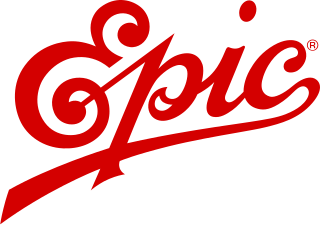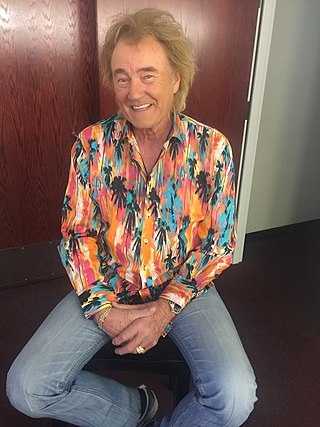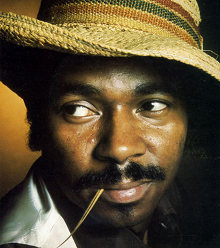Related Research Articles

MCA Records was an American record label owned by MCA Inc., which later became part of Universal Music Group.

Epic Records is an American record label owned by Sony Music Entertainment, a subsidiary of Sony Corporation of America, the American division of Japanese conglomerate Sony. The label was founded predominantly as a jazz and classical music label in 1953, but later expanded its scope to include a more diverse range of genres, including pop, R&B, rock, and hip hop.
ABC Records was an American record label founded in New York City in 1955. It originated as the main popular music label operated by the Am-Par Record Corporation. Am-Par also created the Impulse! jazz label in 1960. It acquired many labels before ABC was sold to MCA Records in 1979. ABC produced music in a variety of genres: pop, rock, jazz, country, rhythm and blues, soundtrack, gospel, and polka. In addition to producing records, ABC licensed masters from independent record producers, and purchased regionally released records for national distribution.

"Back in My Arms Again" is a 1965 song recorded by The Supremes for the Motown label.

DreamWorks Records was an American record label founded in 1996 by David Geffen, Mo Ostin, his son Michael Ostin and Lenny Waronker as a subsidiary of DreamWorks Pictures. The label operated until 2003 when it was sold to Universal Music Group. The label itself also featured a Nashville, Tennessee-based subsidiary, DreamWorks Nashville, which specialized in country music and was shut down in 2006 then moved to MCA Nashville. The company's logo was designed by Roy Lichtenstein and was his last commission before his death in 1997.

Charlie McCoy is an American harmonica virtuoso and multi-instrumentalist in country music. He is best known for his harmonica solos on iconic recordings such as Candy Man, He Stopped Loving Her Today, I Was Country When Country Wasn't Cool, and others. He was a member of the progressive country rock bands Area Code 615 and Barefoot Jerry. After recording with Bob Dylan in New York, McCoy is credited for unknowingly influencing Dylan to decide to come to Nashville to record the critically acclaimed 1966 album "Blonde on Blonde".

Edward Garvin Futch, known professionally as Eddy Raven, is an American country music singer and songwriter. Active from 1962 to 2019, Raven has recorded for several record labels, including ABC, Dimension, Elektra, RCA, Universal, and Capitol Records. After multiple albums which yielded few hit songs, his greatest commercial success came between 1984 and 1990, during which time Raven achieved six number-one singles on the Billboard Hot Country Songs charts. These were "I Got Mexico", "Shine, Shine, Shine", "I'm Gonna Get You", "Joe Knows How to Live", "In a Letter to You", and "Bayou Boys". Raven has a total of eighteen top-ten hits on that chart. Although his chart success diminished in the 1990s, Raven continued to record throughout the 1990s and into the 21st century. In addition to his own work, he has written singles for Don Gibson, Randy Cornor, Jeannie C. Riley, Connie Smith, and The Oak Ridge Boys among others. Raven's music is defined by mainstream country, country pop, Cajun music, and reggae, and he wrote a large number of his singles by himself or with Frank J. Myers.
All Platinum Records was a record company started in 1967 by singer/writer/producer Sylvia Robinson and her husband, businessman Joe Robinson, who had previously worked in the recording industry.

"(Keep Feeling) Fascination" is a song by English synth-pop band the Human League. It was composed by Jo Callis and Philip Oakey, and produced by Martin Rushent.
Cashbox, also known as Cash Box, is an American music industry trade magazine, originally published weekly from July 1942 to November 1996. Ten years after its dissolution, it was revived and continues as Cashbox Magazine, an online magazine with weekly charts and occasional special print issues. In addition to the music industry, the magazine covered the amusement arcade industry, including jukebox machines and arcade games.

Van Allen Clinton McCoy was an American record producer, arranger, songwriter and singer. He is known for his 1975 internationally successful hit "The Hustle". He has approximately 700 song copyrights to his credit, and produced songs by such recording artists as Brenda & the Tabulations, David Ruffin, The Stylistics, The Presidents, Faith, Hope & Charity, New Censation, Gladys Knight & the Pips, Aretha Franklin, Peaches & Herb, Lesley Gore, and Stacy Lattisaw.

"Flashdance... What a Feeling" is a song from the 1983 film Flashdance with music by Giorgio Moroder and lyrics by Keith Forsey and the song's performer, Irene Cara. Moroder had been asked to score the film, and Cara and Forsey wrote most of the lyrics after they were shown the last scene from it in which the main character dances at an audition for a group of judges. They felt that the dancer's ambition to succeed could act as a metaphor for achieving any dream a person has and wrote lyrics that described what it feels like when music inspires someone to dance. The song wound up being used for the scene they watched as well as during the opening credits as the main character is shown working as a welder.

"Are You Lonesome Tonight?" is a song written by Roy Turk and Lou Handman in 1926. It was recorded several times in 1927—first by Charles Hart, with successful versions by Vaughn De Leath, Henry Burr, and the duet of Jerry Macy and John Ryan. In 1950, the Blue Barron Orchestra version reached the top twenty on the Billboard's Pop Singles chart.

Melba Joyce Montgomery is an American country music singer and songwriter. She is known for a series of duet recordings made with George Jones, Gene Pitney and Charlie Louvin. She is also a solo artist, having reached the top of the country charts in 1974 with the song, "No Charge". Born in Tennessee but raised in Alabama, Montgomery had a musical upbringing. Along with her two brothers, she placed in a talent contest which brought her to the attention of Roy Acuff. For several years she toured the country as part of his band until she signed with United Artists Records in 1963.

What a Feelin' is the second studio album by American singer-songwriter Irene Cara. Released on November 2, 1983, this album is a continuation of the work that Cara began with producer Giorgio Moroder on the soundtrack to the 1983 film Flashdance. The dance-pop song she co-wrote with Moroder and Keith Forsey for the film, "Flashdance... What a Feeling", went to number one on Billboard magazine's Hot 100 and foreshadowed the style of this album, which was unlike her R&B-heavy debut. Although Cara was more accustomed to composing music, she relinquished most of those duties to Moroder here and shifted much of her songwriting focus to lyrics.

This article contains information about albums and singles released by the American musical duo Ike & Tina Turner.

"You Can Go Home" is a song by the American country rock band The Desert Rose Band, which was released in 1991 as the lead single from their fourth studio album True Love. It was written by Chris Hillman and Jack Tempchin, and produced by Tony Brown.

Sheila Marlene Andrews was an American country music singer. Signed to the Ovation label, she recorded three studio albums in her career and released several singles on the Billboard Hot Country Songs including "It Don't Get Better Than This", her highest charting single.
Hilltak records was a Californian Independent record label that was formed in the late 1970s. Artists that produced hits for the label include 9th Creation, Patti Hendrix, Broadway, Dalton & Dubarri, and The Guess Who. The label started out as a subsidiary of Atlantic Records but terminated the relationship some time later.
Bobby Penn is a US country music singer-songwriter and musician. He had three charting hits. His most successful was "You Were on My Mind"
References
- ↑ Billboard, February 25, 1984 - Page 63 Country, New Indigo Cable Service To Target Older Viewers - EDWARD MORRIS
- ↑ Billboard, February 19, 1983 - Page 64 Indigo's Valentine to You, ...The music America Loves & Remembers best,
now available on Audiograph, Brylen, & Phonorama Records - ↑ SensCritique - Albums > Reachin’ for the Feeling
- ↑ Cash Box, September 24, 1983 - 1-3 Total Music/Video Business Goal Of Indigo Music Group, THE INDIGO MUSIC CORPORATION STAFF
- ↑ Cash Box, November 27, 1982 - Page 10 NEWS & REVIEWS, EXECUTIVES ON THE MOVE, Figlio Joins Indigo
- ↑ Cash Box, January 22, 1983 - Page 10 NEWS & REVIEWS, EXECUTIVES ON THE MOVE, Thies Named At Indigo
- ↑ Billboard, January 22, 1983 - Page 4 NEWS, Executive Turntable, Publishing
- ↑ Cash Box, March 5, 1983 - Page 10 NEWS & REVIEWS, EXECUTIVES ON THE MOVE, Norman Named
- ↑ Cash Box, April 2, 1983 - Page 10 Accord/Townhouse Sold To Indigo Music Corp.
- ↑ Billboard, March 26, 1983 - Page 3 NEWS, Indigo Music Buys Accord
- ↑ Cash Box, April 2, 1983 - Page 10 Accord/Townhouse Sold To Indigo Music Corp.
- ↑ Cash Box, April 2, 1983 - Page 10 NEWS & REVIEWS, EXECUTIVES ON THE MOVE, Indigo Adds Two
- ↑ Cash Box, April 14, 1984 - Page 22 Indigo Music Debuts Prime Of Life Network
- ↑ Billboard, February 25, 1984 - Page 63 Country, New Indigo Cable Service To Target Older Viewers - EDWARD MORRIS
- ↑ The Guardian, 21 Mar 2012 - Old music: Smith Perkins Smith – Say No More by Paul Nettleton
- ↑ SensCritique - Albums > Reachin’ for the Feeling
- ↑ Hideki Watanabe Archives - Reachin' for the Feeling
- ↑ Illinois Rock & Roll Music Archives, Apr 28, 2024 - Pearl Handle By Ken Voss
- ↑ Discogs - Bobby Penn – Blue Lady